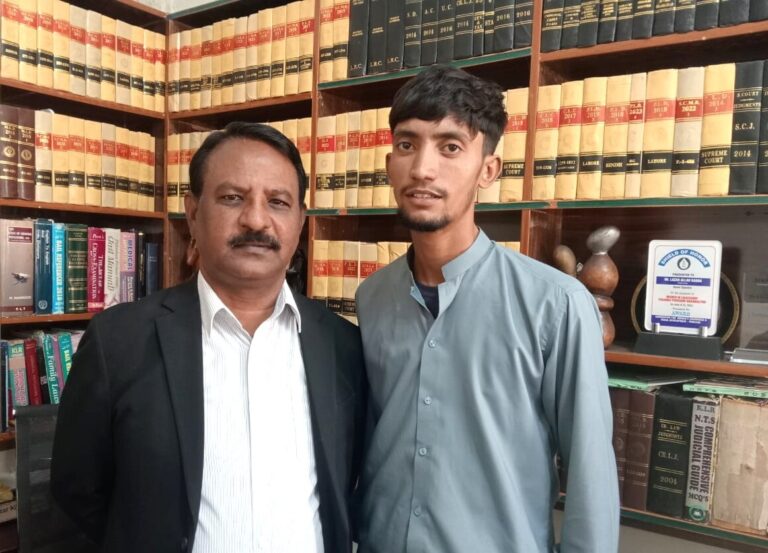A 22-year-old Pakistani Christian man has won a seven-month legal battle to have the religious designation corrected on his national identity card.
In a systemic issue with personal, legal and social implications for Pakistan’s vulnerable minority communities, Bahawalpur Civil Judge Anam Younis on October 17 directed the National Database and Registration Authority (NADRA) to issue Rahul Masiha with a new identity card bearing his name and Christian faith, Masih’s lawyer said.
Lawyer Lazar Allah Raka said Masih’s original identity card, issued in June 2022, had his correct name and faith listed, but when he applied for a duplicate card after losing the original, NADRA issued him with an identity card that listed his name as Sufian Ali and his religion as Islam.
“Mr. Masi visited the NADRA office many times, but his pleas to correct the mistake were not accepted,” Mr. Raka told Christian Daily International Morning Star News.
Masih, a Catholic who works in the office of a private housing association, had no choice but to seek court intervention in the matter with the support of legal advocacy group ADF International, Laca said.
Raka said that during the court proceedings, NADRA representatives claimed that Masi had intentionally converted to Islam and registered as a Muslim, but they were unable to substantiate that claim with documentary evidence.
“Noting that the defendant had failed to undermine Mr. Masi’s position, the judge ordered NADRA to issue him a national identity card based on his correct name and religion,” he said.
During the process, Masi presented his baptism and school certificates and brought his Christian parents to testify about his faith.
“I have never been a Muslim, I have always been a Christian,” Masih told Christian Daily International Morning Star News. “I was surprised when NADRA officials told me that my name and religion on my identity card had been changed and that they could not change it now as I am registered as a Muslim. Despite my pleas that this was not true, they remained adamant about correcting the mistake.”
Pakistani authorities generally refuse to allow people registered as Muslims to change their religious identity. Courts and authorities have consistently denied such requests unless records can be proven to be incorrect or someone has converted to Islam.
Mr Raka said incorrect registration can result in serious legal, social and economic disadvantages, and in some cases lead to discrimination and security risks.
“According to NADRA’s CNIC (Computerized National Identity Card) registration policy, any mistake in correctly stating the religion of an applicant by an illiterate person can be dealt with under the category of clerical negligence,” he said. “While NADRA readily allows conversions to Islam, conversions from Islam to another religion are often treated with suspicion and rejected. Applicants are typically told to obtain a court order directing NADRA to make amendments, resulting in lengthy and expensive litigation.”
He pointed out that minorities incorrectly identified as Muslims in NADRA records are not considered eligible under minority employment and education quotas at the federal and state levels.
Religious minorities are allocated approximately 5 percent quotas in federal and local public sector jobs. Since recruitment databases and human resources systems rely on CNIC information, “even genuine minority candidates are automatically excluded if they are incorrectly registered as Muslim,” he said.
“Similarly, state governments, especially Punjab, have reserved 2 per cent quota in public universities for minority students,” Lakha said. “Eligibility for these seats requires verification by NADRA records. If a student’s religious identity is incorrectly registered, the student will not be able to be considered for minority seats or related scholarships.”
It added that incorrect registration contributes to under-utilization of reserved seats as institutions report vacancies when eligible candidates are excluded due to technical reasons.
He said incorrect description of religion on national identity cards also affects civil documents such as passports, family register certificates (FRCs), school records and marriage registration systems.
“Personal law also relates to religious identity, and any misstatement would complicate the legal recognition of marriage,” Raka said. “Inheritance laws vary by religion, which also affects inheritance rights.”
Incorrect registration can also pose security and social risks.
“If a minority person registers as Muslim, they may lose access to minority rights and face suspicion and backlash if the truth about their religious identity is revealed,” he said. “For those who have converted from Islam, changing the religion on record with NADRA is particularly dangerous, exposing individuals to charges of apostasy and coercion.”
Apostasy is considered a crime punishable by death in most schools of Islamic jurisprudence. Pakistan has no specific law denying Muslims the right to proselytize, but apostasy can be punished under Section 295-A of the country’s blasphemy law, which carries a penalty of up to two years in prison for “outraging the religious sentiments of any class of citizens.”
Addressing this issue is essential to ensuring equal citizenship, freedom of religion and inclusive governance in Pakistan, the lawyer said.
“The government should streamline the NADRA amendment process with a transparent, safe and affordable mechanism for amending religious identity items,” he said. “Legal safeguards should also be introduced to protect individuals who seek to rectify their religion without fear of persecution.”
Pakistan was ranked 8th on Open Doors’ 2025 World Watch List of the most difficult countries to become a Christian.
